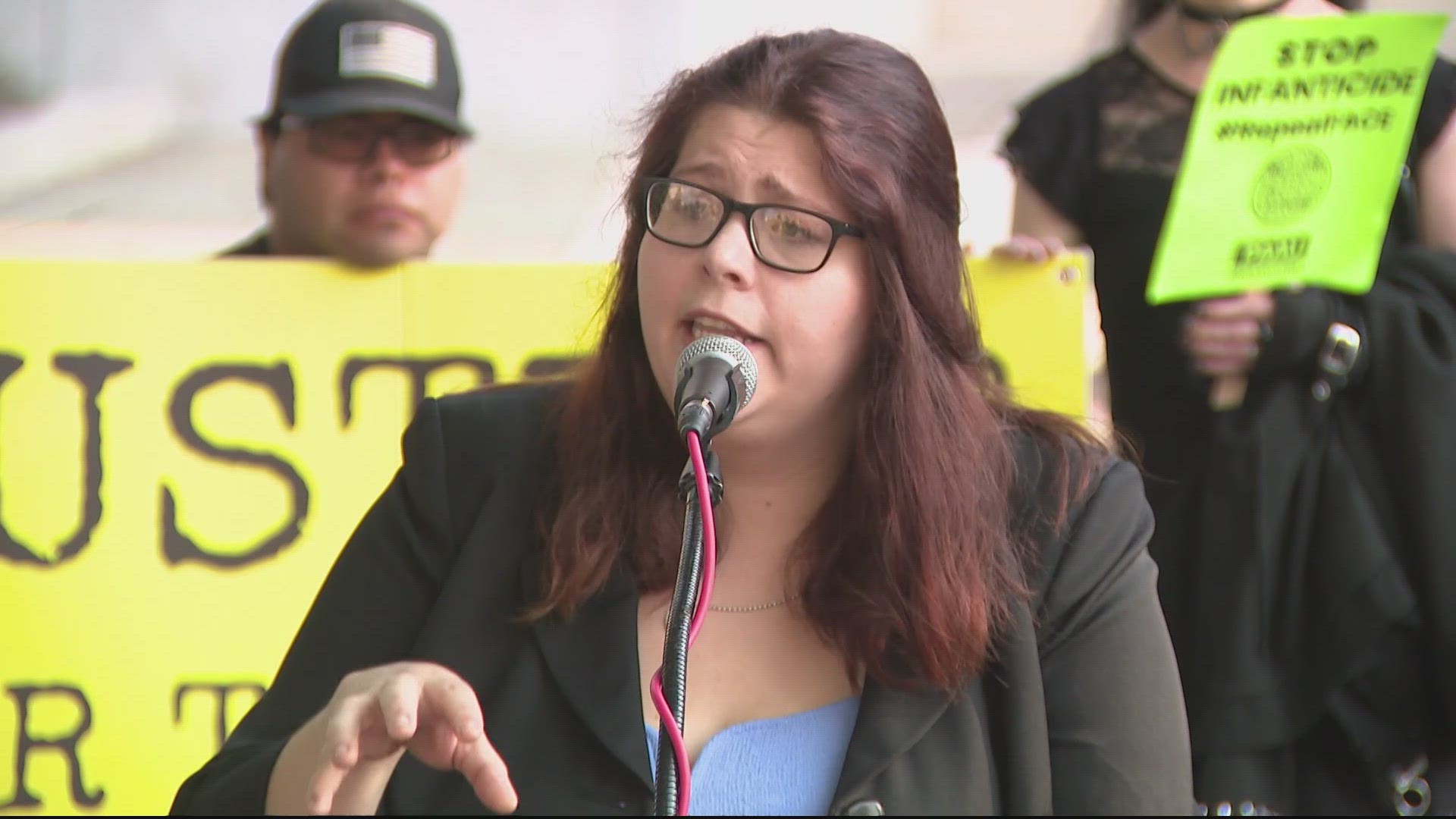WASHINGTON — An anti-abortion activist accused of plotting to blockade a D.C. clinic in 2020 told jurors Tuesday she believed live-birth abortions were taking place at the facility in testimony that repeatedly threatened to run afoul of a judge’s order limiting evidence in the case.
Lauren Handy was charged last year as the lead defendant in a 10-person federal indictment alleging a conspiracy to blockade the Washington Surgi-Clinic and violations of the Freedom of Access to Clinic Entrances (FACE) Act. Five members of that group, including Handy, began trial last week in D.C. District Court.
Handy took the stand Tuesday morning in her own defense – telling jurors she’d dedicated herself to activism after skipping finals in college to attend an anti-abortion press conference in D.C. Her decision was motivated by a video created by an anti-abortion group purporting to show the medical director of the Washington Surgi-Clinic claiming he wouldn’t provide aid to a baby born alive after an abortion. In an order Monday, U.S. District Judge Colleen Kollar-Kotelly barred the actual video from the trial – saying Handy and the creators of the video had mischaracterized what the doctor said and describing it as “propaganda.” In a previous order, Kollar-Kotelly also barred Handy from claiming she was acting out of necessity or in defense of another person.
No evidence has been entered at trial of any wrongdoing on the part of the Washington Surgi-Clinic, and a WUSA9 review of five years of D.C. Department of Health reports found inspectors had consistently found nothing to cite at the clinic.
The judge gave Handy’s attorney, Marty Cannon, credit for “threading the needle” around her order in his questioning, but much of the morning was nevertheless taken up resolving objections from the government as Cannon sought to question Handy about how the video impacted her beliefs about the clinic.
“She’s trying to give the jury, frankly, rank hearsay and gossip provided by propagandists,” Assistant U.S. Attorney John Crabb said during arguments while jurors were outside of court.
Kollar-Kotelly said Handy was allowed to testify about her beliefs, and, eventually, she did. Handy told jurors she had been working with the Missionaries of Charity, a Catholic order founded by Mother Teresa, in Haiti when she decided her calling was to return to the U.S. and engage in anti-abortion activism full time.
“My Calcutta was the abortion facilities,” Handy said.
During her testimony, Handy didn’t deny helping to organize what her group called a “rescue” at the clinic and advocating specifically for that location. During the government’s case, another activist, Caroline Davis, testified that Handy had walked the group through the plan for the abortion blockade and even gone over the possibility of arrest and the specific offense, FACE, those who physically blocked doors could potentially be charged with. On the stand Tuesday, Handy denied any role in encouraging the use of locks and chains and said she repeatedly stressed non-violence.
“Our commitment to non-violence was our strongest point of unity,” Handy said.
Crabb opted for a short cross-examination that focused on Handy’s claim her only reason for going to the Washington Surgi-Clinic was her belief that live-birth abortions were occurring there. He pointed out that nowhere at the time had she described that motivation, including in a Facebook post promoting the event as a historic “lock and block.” Handy also told police officers on scene that her group was there to physically block the clinic.
“Today we are doing a rescue,” Handy says on D.C. Police body-worn camera video of the interaction. “We are basically blocking the facility to prevent abortions today.”
The cross-examinations of two of Handy’s co-defendants, Heather Idoni and Herb Geraghty, were much lengthier and more contentious. Under questioning from Assistant U.S. Attorney Sanjay Patel, repeatedly denied memory of events surrounding the blockade – including the planning meeting the night before and seeing other activists right in front of her attaching chains to bike locks placed around their necks inside the clinic. On body-worn camera video admitted as evidence by the government, Idoni can be seen telling an officer she would not let anyone into the employee entrance of the clinic. After a contentious back-and-forth, she ultimately admitted she was aware that was potentially illegal.
“Did you know you could be arrested for blocking the door?” Patel asked.
“If I blocked the door I could possibly be arrested,” Idoni said.
“And that was a decision you made that day?” Patel asked.
“Yes,” Idoni responded.
Idoni denied, however, that she blocked an Indian woman and her husband from entering the clinic for a schedule appointment. The woman, who testified earlier in the trial under a pseudonym, said she had collapsed on the floor in extreme pain after activists refused to let her inside. Idoni said she had seen no evidence she’d blocked the couple from entering the clinic, although prosecutors suggested a distinctive piece of clothing Idoni was wearing could be seen in surveillance video of the couple as the woman sat on the floor in distress.
The day ended with a third co-defendant, Geraghty, on the stand under cross-examination after testifying that he had not come to the clinic to reach out to patients and not to block any entrances. He said he had not been involved in planning any blockade – a word his attorney, John Kiyonaga, repeatedly objected to the government using. Under questioning from Patel, Geraghty acknowledged he had been involved in a press release written by Handy for the event that mentioned the possibility of charges under the FACE Act and had also discussed with her that up to 14 people were planning on “risking arrest” that day.
“I knew that some people were planning on blocking the doors,” Geraghty said, adding that others were planning on doing “completely legal” sidewalk outreach.
Geraghty’s cross-examination was expected to continue Wednesday. At least one other defendant, William Goodman, indicated he also planned to take the stand.

